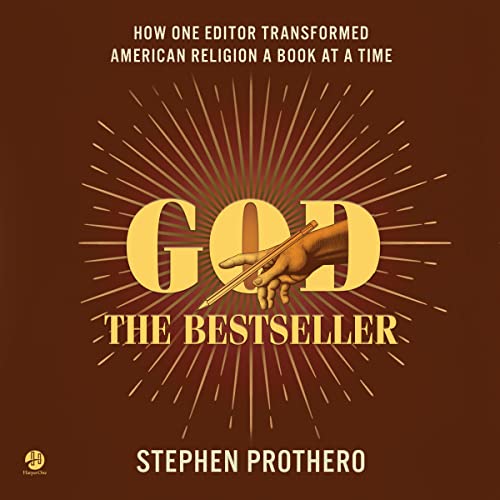In the 1920’s, books about religion were the second biggest-selling genre, next to adult fiction. When Eugene Exman became religion editor for one of America’s biggest publishing companies, he resolved to churn out bestsellers that would go beyond “hidebound dogmas” to teach the public to pursue the common religious experience that allegedly underlies all of the world’s religions. And so he did.
. Anthony Sacramone reviews and interacts with the book for Religion & Liberty in an article entitled The Gods of the Trade Book Publishers.
Exman had an overwhelming religious experience when he was 16 years old. He would describe it as God invading him in a flash of light that lifted him out of his body. He resolved to become a minister and a missionary, but he became disillusioned with doctrinal Christianity at the University of Chicago divinity school. Instead, he went into the publishing industry, first at the University of Chicago Press, and then serving as the religion editor for Harper & Brothers., later Harper & Rowe, from 1928-1965.
“Exman dedicated his publishing career to producing a ‘Book of Books,'” says Sacramone, “one that collated the best that all religions and spiritual practices had to offer in the way of religious experience.”
Exman published the work of his pastor, Harry Emerson Fosdick, a prominent figure in the “modernist-fundamentalist” debate, who became a popular preacher of the new liberal theology. Fosdick’s books became bestsellers.
Exman also published Aldous Huxley’s The Perennial Philosophy (1945), which argued for the unity of all religions, as well as Doors of Perception (1954) about Huxley’s religious experimentation with psychedelic drugs. He also published D.T. Suzuki’s Essays in Zen Buddhism (1949), which popularized Zen in the United States.
Exman and his key editor Margueritte Bro were both interested in the psychic Edgar Cayce, a supposed “devout Christian” who had visions of Atlantis and reincarnation, but he was too controversial for Harper to publish, though it did publish the autobiography of the “trance medium” Arthur Ford.
Exman considered the medical missionary and musician Albert Schweitzer to be “the Thirteenth Apostle” and Harper published a number of books by and about the Lutheran-in-name-only who cast doubt on the “historical Jesus” but who won the Nobel Peace Prize.
He also published the autobiography of Dorothy Day, the social activist and editor of The Catholic Worker, who is currently being considered for sainthood. But Harper turned down her more traditionally orthodox biography of Saint Therese of Lisieux out of what Prothero called “anti-Catholic bias.”
Other authors Exman published and introduced to the American public included the unconventional Catholic theologian Pierre Teilhard de Chardin, the Hindu popularizer Jiddu Krishnamurti, and civil rights leader Martin Luther King Jr.
Prothero is sympathetic to Exman and his cause. But Sacramone is more skeptical:
Despite his contribution to our age of the “nones,” the swapping out of religion for spirituality, “Exman himself was spiritual and religious. He faithfully went to church. He put money in the collection plate. He sat on church committees. But he didn’t believe the real work of the spirit happened amid stained glass and altars.” That fear of the dreaded “hidebound dogma” again. . . .
The essence of religio is to bind together. And while the experience-chasers can hold coffee klatsches and small group meet-ups to discuss all the feels, that is not and never will be a religion. Which Prothero more or less gets. . . .
In pursuit of meaning, he put between covers many a spiritual path. And despite his pursuit of that “perennial philosophy,” what can only be deemed contradictory spiritual paths.
I would add two observations. With the exception of King, Day, and Huxley, very few of Exman’s bestsellers have stood the test of time. As Sacramone notes, Schweitzer has been (unfairly) cancelled–despite his anti-colonialism and his selfless service to poor Africans–because he is considered “patronizing” to the people he was trying to help. As for the best-selling liberal preacher Fosdick, according to church historian Martin Marty whom Sacramone quotes, “No one today need read him or probably does read him for a single theological insight.”
Also, the books Exman has given us include what has since become mainline liberal Protestantism–which professes to be more “rational” and “scientific” than “fundamentalism”–and also psychics, gurus, druggies, and mystics whose focus is just as “supernatural” as those who believe in “hidebound dogmas,” but less rational.
That reveals something important about theological liberalism. Namely, as Sacramone points out, an emphasis on religious experience, combined with indifference to the nature and object of that experience, which would bring us back to the centrality of religious truth.
That is to say, dogmas. And “hidebound” refers to the leather binding of the books in which those dogmas were published.
Illustration from Amazon












